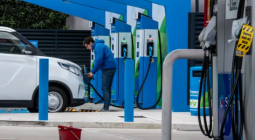EU to delay new green rule in bid to appease protesting farmers
Delay to rules on setting aside land to encourage biodiversity offered as concession amid continuing protests
Farmers protesting across Europe have won their first concession from Brussels, with the EU announcing a delay in rules that would have forced them to set aside land to encourage biodiversity and soil health.
About 10,000 French farmers stepped up their protests on Wednesday, with at least 100 blockades on major roads across France, as 18 farmers were arrested for blocking traffic as they tried to reach the wholesale food market at Rungis, south-east of Paris and 79 others were detained after they managed to get inside.
Belgian farmers joined protests at the French border and others blocked access roads to the Zeebrugge container port for a second day. Spanish and Italian farmers also demonstrated.
The European Commission vice-president, Maroš Šefčovič, described Wednesday’s decision to delay rules on setting aside land, which is expected to be rubber-stamped by member states within 15 days, as “a helping hand” for the sector at a difficult time.
Citing flooding, wildfires in Greece, heatwaves across southern Europe and drought in Spain which has left reservoirs in Andalucia at 20% normal levels, he said it was important to listen to farmers and “to avoid the polarisation which is making any good conversation and discussion more difficult.
“We feel we are obliged to act under this pressure which the farming community [is feeling],” he said. “We have had a number of extreme meteorological events, droughts, flooding in various parts of Europe, and there was a clear negative effect on the output, on the revenue – and of course, decreased income – for the farmers.”
Combined with higher energy prices, the weather-related risks to crops meant farmers were at a “persistent pain point” that was “driving up the cost of production and squeezing revenues”, Šefčovič said.
Under the rules, farmers were expected to keep 4% of their arable land free from crop production in an effort to regenerate the health of the soil and increase biodiversity, which is also in crisis.
Alternatively, farmers could have got an exemption from this “set-aside” rule if they had used 7% of their land for “catch crops” such as clover, which provide cover for the soil after the main crop is harvested.
However, under the new proposals, farmers will not be obliged to set aside fallow land, or any portion of land for catch crops, until 2025.
The change comes as farm protests have been intensifying, in the past 24 hours. On Wednesday, French farmers from the south-west of the country managed to get around police barriers south of Paris by taking back-roads or switching from tractors to trucks in order to reach the area near the Rungis food market. The French interior minister, Gérald Darmanin, had warned that while farmers’ protests on motorways would be tolerated, police would not allow them to block airports or Rungis, Europe’s largest fresh food market.
The Créteil prosecutor’s office outside Paris said that 15 of the 18 farmers arrested near Rungis were in custody being questioned by police.
French farmers also blocked roads around Lyon. At a farmers’ roadblock in Cavaillon in the south, foreign produce, including Italian kiwifruit and pears, was unloaded from lorries.
Virgile, a farmer demonstrating, told BFMTV: “This is about the anger of country people being treated by fools. We work like dogs. Our message is: Buy French produce, make that effort.”
After days spent calling for higher incomes, less red tape and protection from foreign competition, “there are huge expectations” among farmers, said Arnaud Rousseau, the head of France’s largest agricultural union, the FNSEA. He added that not all of the demands could be immediately answered “so I’m trying to call for calm and reason”.
Until now, farmers have not been impressed with the quick fixes offered by politicians or officials in Brussels. They have concerns about the high cost of land, the pressure from supermarkets to sell crops at near-cost prices, and the plethora of new environment rules coming in the form of EU nature restoration laws.
Their critics say EU farmers are among the most cosseted sectors in the industry, with more than €307bn (£260bn) – 30% of the overall EU budget – earmarked for them between 2023 and 2027.
Asked if Wednesday’s concession would be enough to quell the protests, Šefčovič admitted that the EU had to “intensify” the dialogue with farmers to make sure they were listened to. “We have to make sure that Europe will become a continent which will be habitable, also, in the future,” he added.
The European Commission will also set up measures to limit market disruption from Ukrainian products entering the EU, after tariffs were lifted in response to Russia’s invasion.
France will oppose a trade deal between the European Union and the South American Mercosur bloc – a key grievance for protesters – being signed in its current state.
The French economy minister, Bruno Le Maire, said there would be closer surveillance of European food trading platforms to ensure that “farmers’ income is not the first thing to be sacrificed in trade negotiations”.
Cover photo: Farmers block the road in the Chilly-Mazarin district of Paris. Photograph: Mustafa Yalcin/Anadolu/Getty Images






